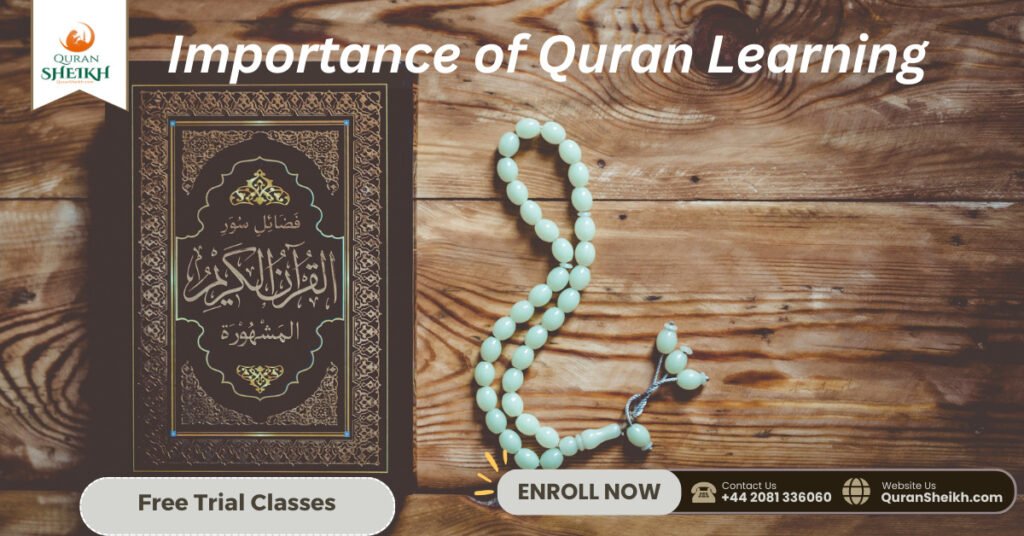1. Introduction to Quran Learning Classes
Quran Learning Classes hold a significant place in the hearts and minds of Muslims around the world. Reciting and understanding the Quran is important for spiritual growth and connecting with the Divine. Muslims believe it is Allah’s word and hold it in high regard.
Quran Learning Classes provide a structured and guided approach to studying and comprehending the teachings of the Quran. This article explores the importance of Quran Learning Classes. It discusses their structure, curriculum, and various methods for effective learning. Additionally, it highlights the benefits these classes provide to individuals and communities.
Additionally, it will address the challenges faced in Quran Learning and provide solutions, along with guidance on how to select the right Quran Learning program. Join us on this enlightening journey as we delve into the world of Quran Learning Classes.
Join thousands of Muslim Families who love learning Quran, Arabic and Islamic Studies from the comfort of their Homes.
1. Introduction to Quran Learning Classes

Defining Quran Learning Classes
Quran Learning Classes refer to structured educational programs designed to teach individuals the recitation, understanding, and memorization of the Quran, the holy book of Islam.
These classes offer a supportive and systematic approach to help students deepen their connection with the Quran and develop a comprehensive understanding of its teachings.
History and Significance of Quran Learning
The practice of Quran learning has a rich historical significance within Islamic culture. Prophet Muhammads companions recited, taught and memorized the Quran since his time, ensuring its passage through generations.
Muslims place a great importance on Quran learning as it enables them to connect with Allah’s divine words, attain spiritual enlightenment, and lead a guided life following the teachings of the Quran.
2. Importance of Quran Learning

Spiritual Significance of Quran Learning
Quran learning holds immense spiritual significance for Muslims. It serves as a means of establishing a deep connection with Allah, fostering inner peace, and increasing faith. By engaging in the recitation and comprehension of the Quran, individuals have the opportunity to discover comfort, pursue direction, and enhance their connection with the divine.
Intellectual Benefits of Quran Learning
Engaging in Quran learning enhances one’s intellectual capacities. Developing cognitive abilities, problem-solving aptitude, and critical thinking is greatly encouraged.
Students of the Quran learn to analyze and interpret its verses, gaining a broader understanding of complex concepts and cultivating a sense of intellectual curiosity.
Moral and Ethical Growth through Quran Learning
Quran learning plays a vital role in shaping an individual’s character and moral compass. The Quran contains timeless principles of ethics and virtues that guide Muslims in their personal and social lives. By studying the Quran, individuals learn about compassion, honesty, integrity, and other values that help them become better human beings.
Quran Memorization Course Online with an Arab teacher with 30% Off
3. Structure and Curriculum of Quran Learning Classes

Overview of Quran Learning Class Structure
Quran learning classes typically follow a structured format to ensure systematic progress. Students are grouped according to their proficiency levels, and classes are conducted in a conducive learning environment. Each session focuses on specific aspects of Quran learning, including recitation, understanding, and memorization.
The Components of Quran Learning Curriculum
The Quran learning curriculum is designed to cover various aspects of the book comprehensively. It includes studying the Arabic alphabet, learning Tajweed (rules of Quran recitation), understanding the meanings of verses, and exploring the Quran’s thematic concepts. Additionally, the curriculum emphasizes memorizing selected chapters or the entire Quran.
Incorporating Tajweed and Pronunciation into the Curriculum
Tajweed, the proper pronunciation and recitation of the Quran, is a crucial component of Quran learning. Students are taught the rules of Tajweed to ensure accurate and melodious recitation.
By incorporating Tajweed into the curriculum, learners develop a strong foundation in Quranic recitation and enhance their connection with the divine words.
Teaching Methods for Quran Recitation and Memorization
Quran learning classes employ various teaching methods to facilitate effective recitation and memorization. These methods include repetition, recitation drills, group recitation, and individual attention. In order to improve students’ capacity to memorize and preserve the verses of the Quran, teachers employ mnemonic strategies, recitation drills, and visual aids.
4. Methods and Techniques in Quran Learning
Traditional Approaches to Quran Learning
Traditional approaches to Quran learning involve the teacher-student relationship, where the Sheikh (teacher) imparts knowledge through oral instruction and direct interaction.
The emphasis in this approach lies on upholding the oral tradition of the Quran while ensuring the transmission of knowledge from one generation to another.
Modern Techniques in Quran Learning
Incorporating modern techniques, Quran learning has benefited from advances in technology. Online platforms, interactive apps, and multimedia resources have made Quranic studies more accessible and engaging. These modern techniques provide flexibility, interactive learning experiences, and opportunities for self-paced learning.
Utilizing Technology in Quran Learning
Technology has revolutionized Quran learning by providing virtual classrooms, online resources, and digital tools. Students can access Quranic recitation, translations, and explanations through websites, mobile applications, and audio-video platforms.
Technology has made it easier for individuals from different backgrounds and locations to engage in Quran learning, fostering a global community of learners.
5. Benefits and Impact of Quran Learning Classes
Spiritual Growth and Connection with the Divine
Embarking on a journey of Quran learning opens the doors to spiritual growth and fosters a deeper connection with the divine. Through studying the Quran, one can explore the teachings and guidance of Islam, gaining a sense of purpose and a stronger bond with Allah. Feeding the spirit and offering solace to the innermost being, this is an experience of profound transformation.
Enhanced Understanding of Islamic Principles
Quran learning classes provide an opportunity to delve into the depths of Islamic principles and beliefs. In these classes, learners gain a comprehensive understanding of the concepts and values laid out in the Quran. Islamic teachings empower individuals with the necessary tools to lead a morally upright life, make well-informed choices, and successfully navigate through the intricacies of the contemporary world.
Positive Impact on Character Development
Studying the Quran under the guidance of knowledgeable instructors helps shape and refine one’s character. The Quran’s teachings emphasize qualities such as patience, humility, compassion, and integrity.
Through the act of actively participating in the Quran, individuals are inspired to manifest these values within their everyday experiences, resulting in personal development, enhanced connections with others, and a beneficial influence on society.
Community and Social Engagement through Quran Learning
Quran learning classes not only provide a platform for personal development but also foster a sense of community and social engagement. Gathered together, students share thoughts, perspectives, and encounters, forming a harmonious community of kindred spirits.
The bonds formed in these classes extend beyond the learning environment, nurturing a sense of belonging and encouraging active participation in the wider Muslim community.
6. Choosing the Right Quran Learning Program
Assessing Personal Learning Objectives
Before embarking on a Quran learning journey, it is essential to assess personal learning objectives. Determine what aspects of Quranic knowledge you wish to acquire and the depth of understanding you seek. This evaluation will help align your goals with the right program that caters to your specific needs.
Researching Quran Learning Programs
Researching and comparing different Quran learning programs is crucial to find the one that suits you best. Look for programs that are reputable, offer qualified instructors, and have a structured curriculum. Read reviews, seek recommendations from others, and explore their teaching methodologies to ensure they align with your preferred learning style.
Considerations for Online Quran Learning
In today’s digital age, online Quran learning programs have gained popularity. When exploring online options, consider factors such as the platform’s reliability, interactive features, and student-teacher interaction. Furthermore, it is crucial to guarantee that the program offers a secure and protected setting for learning, particularly regarding online interactions.
Seeking Recommendations and Testimonials
Don’t hesitate to seek recommendations from friends, family, or trusted community members who have already gone through Quran learning programs. Gain valuable insights and make an informed decision by learning from their firsthand experiences.
Furthermore, reading testimonials and success stories from past students can provide further assurance about the program’s effectiveness.
7. Challenges and Solutions in Quran Learning
Overcoming Language Barriers in Quran Learning
For those whose native language is different from Arabic, understanding the Quran may present some language barriers. However, with perseverance and the guidance of skilled instructors, these barriers can be overcome.
Utilizing translation resources, enrolling in language courses, and seeking clarification from teachers can help bridge the gap and facilitate a richer understanding of the Quran’s message.
Addressing Time Constraints and Commitment Challenges
Balancing the demands of daily life with Quran learning can be challenging. To overcome time constraints, create a realistic schedule that dedicates specific time slots for your learning. Prioritize Quran learning as an essential part of your routine, just like any other commitment. Setting attainable goals and being consistent will allow you to make steady progress on your Quran learning journey.
Dealing with Difficult Quranic Concepts
The Quran encompasses deep wisdom and profound concepts that may pose challenges to learners. When faced with difficult Quranic concepts, don’t be disheartened. Seek guidance from knowledgeable instructors who can unravel complexities and provide clarity. Group discussions and engaging with fellow learners can also shed light on different perspectives and interpretations, enhancing your understanding.
Supporting Learners with Special Needs
Creating a learning environment that is inclusive and accommodates learners with special needs is of utmost importance. Quran learning programs should strive to provide resources and support tailored to individuals with different learning styles or disabilities. Instructors can adapt teaching methods, utilize assistive technologies, and offer individualized guidance to ensure equal opportunities for all learners.
8. Conclusion: The Journey of Quran Learning
Embarking on a Quran learning journey is a fulfilling and rewarding experience. It offers not only spiritual growth but also a deeper understanding of Islamic principles and character development.
By selecting the appropriate program, conquering obstacles, and actively seeking advice, people can open the doors to the Qurans riches and embark on an everlasting path of knowledge, self-exploration, and spiritual connection. So embrace the opportunity, grab your Quran, and let the journey begin!
8. Conclusion: The Journey of Quran Learning
Embarking on the journey of Quran Learning Classes is a profound and transformative experience for individuals seeking to deepen their understanding of Islam and strengthen their spiritual connection.
While participating in these courses, individuals can gain a comprehensive comprehension of the teachings present in the Quran, simultaneously nurturing their moral principles, enhancing their personal characteristics, and finding comfort in Allah’s sacred words.
In the face of trials, such as barriers in communication or limitations on time, viable solutions exist to surmount them and guarantee a rewarding educational journey.
By choosing the right Quran Learning program and utilizing various methods and techniques, learners can embark on a path of personal and communal growth. Let us embrace the beauty and wisdom of Quran Learning Classes and continue this lifelong journey of knowledge and spiritual enlightenment.
What do you do in Quran classes?
Quran classes are a great way to learn about the Quran, the holy book of Islam, and its teachings. In Quran classes, students learn how to read and recite the Quran correctly, as well as the rules of tajweed, which is the science of Quranic recitation. Students also learn about the meaning and interpretation of the Quran, as well as its history and context.
In addition to learning about the Quran itself, Quran classes also teach students about the basic tenets of Islam, such as the five pillars of Islam and the six articles of faith. Students also learn about the lives of the prophets and the history of Islam. Quran classes can also provide students with a strong foundation in the Arabic language.
Quran classes are a valuable resource for Muslims of all ages and backgrounds. They can help students to develop a deeper understanding of their faith and to become more connected to the Quran.
In Quran classes, we embark on a journey of discovery, uncovering the hidden treasures of the Quran. We learn to navigate its labyrinthine verses, unlocking the mysteries of its language and meaning. We explore its rich history and context, gaining insights into its timeless wisdom.
As we delve deeper into the Quran, we encounter its profound teachings on faith, morality, and spirituality. We learn about the prophets and their struggles, and we are inspired by their examples. We discover the Quran’s universal message of love, compassion, and justice.
Quran classes are more than just a place to learn about the Quran. They are a community of learners who come together to grow in their faith and knowledge. We support each other on our journey, and we celebrate each other’s successes.
Quran classes are a gift, and I am grateful for the opportunity to learn and grow in this sacred space.
Can Quran Learning Classes accommodate learners with special needs?
Yes, Quran learning classes can accommodate learners with special needs. In fact, many Quran learning centers now offer specialized classes for students with disabilities. These classes are typically smaller and have more individualized instruction. Teachers in these classes are specially trained to work with students with special needs and to use a variety of teaching methods to meet the needs of all learners.
Here are some of the ways that Quran learning classes can accommodate learners with special needs:
- Use visual and auditory aids: Teachers can use visual and auditory aids, such as flashcards, pictures, and videos, to help students learn the Quran. They can also use technology-based tools, such as interactive whiteboards and tablets, to make learning more engaging and accessible.
- Provide breaks and modifications: Teachers can provide students with breaks and modifications as needed. For example, they may allow students to take breaks more often, or they may give them shorter assignments. They may also modify teaching methods or materials to make them more accessible.
- Use a variety of teaching methods: Teachers can use a variety of teaching methods to meet the needs of all learners. For example, they may use kinesthetic learning activities, such as role-playing and games, to help students learn the Quran. They may also use music and art to make learning more fun and engaging.
If you have a child with special needs who is interested in learning the Quran, there are many resources available to help you find a class that is right for them. You can contact your local mosque or Islamic center to see if they offer any specialized classes. You can also search online for Quran learning centers that cater to students with special needs.
What are the challenges of memorizing the Quran?
Memorizing the Quran is a challenging task, even for those with the best of memories. There are many reasons for this, including:
- The length of the Quran: The Quran is a long book, with over 6,000 verses. Memorizing all of these verses requires a significant amount of time and effort.
- The complexity of the Quranic language: The Quranic language is Arabic, which is a complex language with many different grammar rules and vocabulary. This can make it difficult to understand and memorize the Quran, especially for non-native Arabic speakers.
- The need for accurate memorization: It is important to memorize the Quran accurately, without making any mistakes. This can be difficult, especially for the longer verses.
- The need to review regularly: Once you have memorized a portion of the Quran, you need to review it regularly to avoid forgetting it. This can be a challenge, especially if you are busy with other commitments.
In addition to these general challenges, there are also some specific challenges that people may face when memorizing the Quran. For example, some people may have difficulty memorizing certain words or phrases. Others may find it difficult to concentrate for long periods of time. And still others may be discouraged by the amount of time and effort required to memorize the entire Quran.
Despite the challenges, memorizing the Quran is a rewarding experience. It is a way to deepen your connection to Allah and to His word. It is also a way to learn about the Islamic faith and to gain a deeper understanding of the Quranic message.
Here are some tips for overcoming the challenges of memorizing the Quran:
- Set realistic goals: Don’t try to memorize too much at once. Start with a small amount of verses and gradually increase the amount as you become more comfortable.
- Find a memorization method that works for you: There are many different memorization methods available. Experiment with different methods until you find one that you enjoy and that helps you to learn effectively.
- Be consistent: Review the verses that you have memorized regularly. This will help you to retain the information and to avoid forgetting it.
- Find a memorization partner: Having a memorization partner can be helpful for motivation and support. You can quiz each other on the verses that you have memorized and help each other to stay on track.
- Seek help if needed: If you are struggling to memorize the Quran, don’t be afraid to seek help from a teacher or a hafiz (someone who has memorized the entire Quran). They can provide you with guidance and support.
Memorizing the Quran is a challenge, but it is a challenge that is well worth taking. With patience and perseverance, you can achieve your goal of memorizing the word of Allah.
Best Quran memorization program with qualified Arab tutors and get 30% OFF, Quran classes for Kids


